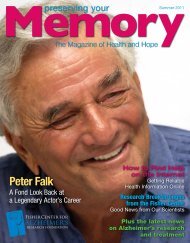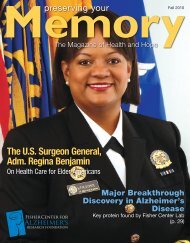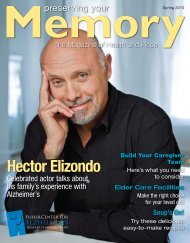Tracie Thoms - Fisher Center for Alzheimer's Research Foundation
Tracie Thoms - Fisher Center for Alzheimer's Research Foundation
Tracie Thoms - Fisher Center for Alzheimer's Research Foundation
Create successful ePaper yourself
Turn your PDF publications into a flip-book with our unique Google optimized e-Paper software.
Emotional Stress of Caregiving<br />
Q36. Using a scale from 1 to 5, where 1 is not at all stressful and 5 is very stressful,<br />
how emotionally stressful would you say that caring <strong>for</strong> your [relation] is/was <strong>for</strong> you?<br />
Base: 2009 All caregivers (n=1,480)<br />
Not at all Stressful<br />
1 2 3 4<br />
Very Stressful<br />
5<br />
25% 22% 22% 14% 17%<br />
% Highly Stressed (4-5)<br />
Caregivers of Recipient Age 18+<br />
2004 (n=1,247) 2009 (n=1,307)<br />
35% 31%<br />
Caregiving. “They need solutions so they can be healthier<br />
and per<strong>for</strong>m better.” Getting in and out of beds, chairs and<br />
other sitting furniture was the most common task, with<br />
personal care tasks a close second (getting dressed, bathing/<br />
showering, etc.).<br />
In part because so many unpaid caregivers work outside<br />
the home, as well, caregiving was rated as a high or medium<br />
burden by 51% of respondents. Not surprisingly, some 35%<br />
of respondents said they rely on paid caregivers to help out,<br />
while 66% relied on other unpaid caregivers.<br />
Just over half of responding caregivers reported that their<br />
care recipients live in their own homes, while about 29% live<br />
with the care recipient. Those who reside with their loved ones<br />
were more likely to have a household income below $50,000<br />
annually (38%, vs. 23% in higher-income households), which<br />
points to the possibility that financial concerns drive the<br />
decision to live with the care recipient in many cases.<br />
The stress of caregiving is a factor <strong>for</strong> many caregivers,<br />
too. Although 57% report that their health is excellent or<br />
very good, 17% report it as fair or poor—compared to 13%<br />
of the general adult population. The longer caregiving goes<br />
on, the more of a toll it takes; 23% of those who have been<br />
providing care <strong>for</strong> 5 years or longer report fair or poor health.<br />
Of course, stress itself is a factor in health, and 31% of<br />
caregivers report feeling very stressed by their situation.<br />
But even with the recent economic decline, caregivers are<br />
not reporting a huge hit to their own finances related to<br />
caregiving. Only 15% reported a strong financial hardship<br />
because of providing care.<br />
The Need <strong>for</strong> In<strong>for</strong>mation<br />
Certainly one of the keenest needs any unpaid caregiver<br />
has is <strong>for</strong> in<strong>for</strong>mation—where to turn <strong>for</strong> help, what to<br />
do in an emergency situation, how best to help their loved<br />
ones, etc. Only 19% of respondents reported receiving<br />
<strong>for</strong>mal caregiving training, while more than threequarters<br />
(78%) would like more help or in<strong>for</strong>mation about<br />
at least one of 14 vital caregiving topic areas identified in<br />
the survey.<br />
For getting that in<strong>for</strong>mation, caregivers are likely to turn<br />
to two sources: their health care providers and the Internet.<br />
Among respondents, 36% said they’d turn to their health<br />
care providers, and 25% would opt <strong>for</strong> the Internet.<br />
Technology is also playing an increasingly larger part<br />
in caregiving. Nearly half (45%) of caregivers reported<br />
using some type of technology in the care of their loved<br />
one, with electronic organizers and calendars leading the<br />
way at 24%, and emergency response systems following<br />
at 12%. Close behind were devices that transmit health<br />
in<strong>for</strong>mation to a doctor’s office automatically, at 11%, and<br />
home-based electronic systems that transmit alerts about<br />
safety problems (such as falls or wandering) to a caregiver<br />
or dispatching system.<br />
Looking Ahead<br />
With emerging technologies now being deployed or soon<br />
on the way, there is help <strong>for</strong> unpaid caregivers that simply<br />
was not available be<strong>for</strong>e. The ability to connect with needed<br />
support via the Internet is obviously a huge factor, but other<br />
personal technologies, including GPS locators to help with<br />
the wandering problem, alert systems that can be set to<br />
monitor potential issues <strong>for</strong> Alzheimer’s patients, and online<br />
health records should help take the load off a group of people<br />
who are taking an enormous load off our overburdened<br />
health care system: America’s caregivers. You can download a<br />
copy of the report at www.caregiving.org. ■<br />
summer 2010 www.ALZinfo.org 17






